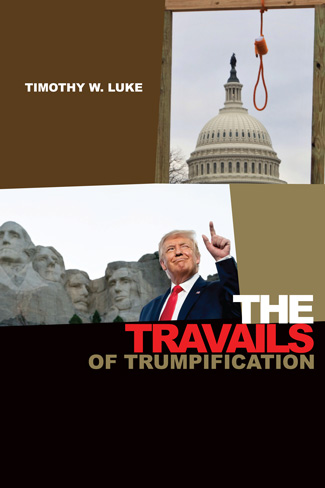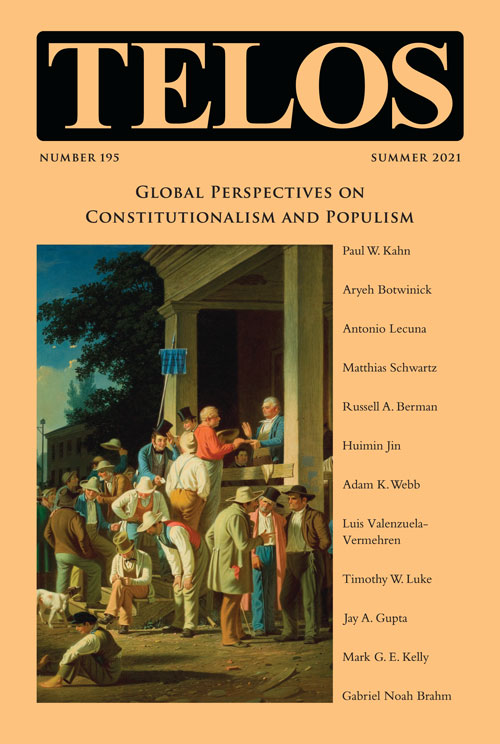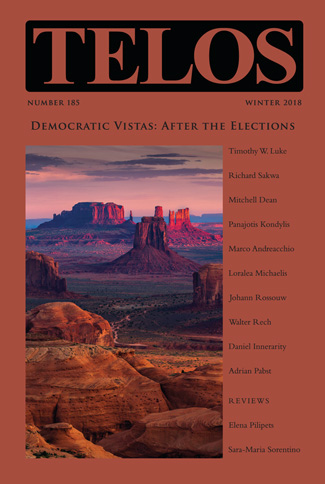By Christophe Guilluy · Wednesday, December 8, 2021 Christophe Guilluy is a geographer and observer of French society. Christopher Caldwell comments on his work here. This interview appeared in Le Figaro on November 21, 2021 and is translated with permission by Russell A. Berman, whose comments are here.
Q: Several months before the presidential election, how do you see the political situation in France?
Christophe Guilluy: Fundamentally nothing much has changed since 2017. I did an interview about the duel between Macron and Le Pen, which I described as a chemically pure cleavage: the popular classes against the professional upper classes, the metropolis against the periphery. None of that has changed at all. The core of Macron’s electoral support is still made up of the bourgeoisies of the right and the left, the boomers, the retirees, people fully integrated into society. And for a good reason: he is the only candidate who defends the economic and cultural model of the past twenty years. Therefore, the electorate willing to follow him is the one that is integrated into this model, that benefits from it or is protected by it, such as the retirees for example. Starting from that, he can count on a hypersolid foundation of those 25%. This has not changed since his election.
On the other hand, there are the disaffected, those no longer integrated economically, those we used to call the middle class.
Continue reading →
By Telos Press · Wednesday, December 1, 2021 Now available from Telos Press: The Travails of Trumpification, by Timothy W. Luke. Order the paperback edition today in our online store and save 20% by using the coupon code BOOKS20. Also available in Kindle ebook format at Amazon.com.
The Travails of Trumpification
by Timothy W. Luke
 Telos Press Publishing is delighted to announce the release of Timothy W. Luke’s new book, The Travails of Trumpification. In this series of critical essays written over the course of Donald J. Trump’s presidency, from its chaotic early days to its calamitous end, Luke explores how the recent twists and turns in the civic life of the United States have precipitated a dangerous transformation of American political culture. Since 2016, Trump’s will to attain, and then retain, his office by whatever means necessary crossed red lines never before violated by any previous presidential administration. Even before his loss in the 2020 election, Trump sought to discredit America’s electoral process by challenging legal voting practices in key swing states on social media, in the courts, through executive agencies, and finally with violent riots, culminating in the disastrous attack on the U.S. Capitol on January 6, 2021. Yet while Trump himself no longer remains president, the “Trumpification” of the American political system persists today, with the majority of Republican politicians as well as Trump’s millions of devoted followers still firmly in the grip of his influence. The goal of the critical probes collected in this volume is to evaluate the “travails,” or excessive tribulation, pain, hardship, anguish, and agony, that his dangerous demagoguery has inflicted—and continues to inflict—on the nation’s democratic institutions and processes. Telos Press Publishing is delighted to announce the release of Timothy W. Luke’s new book, The Travails of Trumpification. In this series of critical essays written over the course of Donald J. Trump’s presidency, from its chaotic early days to its calamitous end, Luke explores how the recent twists and turns in the civic life of the United States have precipitated a dangerous transformation of American political culture. Since 2016, Trump’s will to attain, and then retain, his office by whatever means necessary crossed red lines never before violated by any previous presidential administration. Even before his loss in the 2020 election, Trump sought to discredit America’s electoral process by challenging legal voting practices in key swing states on social media, in the courts, through executive agencies, and finally with violent riots, culminating in the disastrous attack on the U.S. Capitol on January 6, 2021. Yet while Trump himself no longer remains president, the “Trumpification” of the American political system persists today, with the majority of Republican politicians as well as Trump’s millions of devoted followers still firmly in the grip of his influence. The goal of the critical probes collected in this volume is to evaluate the “travails,” or excessive tribulation, pain, hardship, anguish, and agony, that his dangerous demagoguery has inflicted—and continues to inflict—on the nation’s democratic institutions and processes.
Continue reading →
By David Pan · Friday, June 18, 2021 Telos 195 (Summer 2021): Global Perspectives on Constitutionalism and Populism is now available for purchase in our store. Individual subscriptions to Telos are also available in both print and online formats.
 After watching the images of the January 6 Capitol riot, many Americans concluded that right-wing populism threatens the basic rules of our constitutional order. In this view, the U.S. Constitution establishes a universal order that is detached from any particular orientation and provides the neutral ground upon which differences can be discussed, while populists upset the rules of discussion and destroy the basis of a common project. Consequently, since populism is at odds with the Constitution, the solution would be to try to reimpose a measure of rationality upon the unruly. Yet the nagging concern behind this perspective is not just the violation of rules but the suspicion that populism is ultimately motivated by racism and sexism. In this case, the real opposition would not be between constitutionalism and populism but between two understandings of the Constitution, that is, two conceptions of the character of the people, one egalitarian and the other racist. The difficulty is that the laws of a constitution cannot exist independently of a people with a specific history. Rules cannot be neutral but imply a perspective on the world, and the conflict between constitutionalism and populism may in fact be a symptom of a conflict between two factions within the people, each of which is attempting to establish itself as the proper representation of the will of the people as a whole. After watching the images of the January 6 Capitol riot, many Americans concluded that right-wing populism threatens the basic rules of our constitutional order. In this view, the U.S. Constitution establishes a universal order that is detached from any particular orientation and provides the neutral ground upon which differences can be discussed, while populists upset the rules of discussion and destroy the basis of a common project. Consequently, since populism is at odds with the Constitution, the solution would be to try to reimpose a measure of rationality upon the unruly. Yet the nagging concern behind this perspective is not just the violation of rules but the suspicion that populism is ultimately motivated by racism and sexism. In this case, the real opposition would not be between constitutionalism and populism but between two understandings of the Constitution, that is, two conceptions of the character of the people, one egalitarian and the other racist. The difficulty is that the laws of a constitution cannot exist independently of a people with a specific history. Rules cannot be neutral but imply a perspective on the world, and the conflict between constitutionalism and populism may in fact be a symptom of a conflict between two factions within the people, each of which is attempting to establish itself as the proper representation of the will of the people as a whole.
Continue reading →
By Arno Tausch · Tuesday, May 14, 2019 The following think-piece by an active participant in the European public discussion on immigration policy, written well before the European parliamentary elections of May 29, 2019, is understood as a contribution to the European and international political debate and not (so much) as a “pure” scholarly article. It begins with a stark prognosis: the earthquake-like outcome of these elections will strengthen the far-right political parties all over Europe, dramatically weakening the European center and left, and breaking down the “welcome culture” initiated by German chancellor Angela Merkel’s famous statement of late summer 2015—”We can do this” (“Wir schaffen das”)—which signaled a temporary and short-lived “air superiority” for multiculturalism, cultural pluralism, and the welcoming of masses of refugees from the Middle East and North. One of the main reasons for the predictable decline of the Left on the European continent is, in my opinion, its inability to find credible solutions to the problems of immigration and integration.
Continue reading →
By Russell A. Berman · Wednesday, December 12, 2018 Telos 185 (Winter 2018) is now available for purchase in our store. Individual subscriptions to Telos are also available in both print and online formats.
 Recall the 2016 campaign and even more the aftermath of the Trump victory: otherwise reasonable people rushed into heated rhetoric regarding the imminence of dictatorship and the end of democracy as we know it. Comparisons of the America of 2016 and Germany of 1933 proliferated, while denunciations of Republicans as Nazis or Nazi collaborators became common. It would be a worthwhile project for a student or scholar of American culture to cull through those statements and confront their authors with them today: if they were so wrong in 2016, what value is their judgment today, moving forward? Recall the 2016 campaign and even more the aftermath of the Trump victory: otherwise reasonable people rushed into heated rhetoric regarding the imminence of dictatorship and the end of democracy as we know it. Comparisons of the America of 2016 and Germany of 1933 proliferated, while denunciations of Republicans as Nazis or Nazi collaborators became common. It would be a worthwhile project for a student or scholar of American culture to cull through those statements and confront their authors with them today: if they were so wrong in 2016, what value is their judgment today, moving forward?
For those predictions were simply and utterly wrong. Of course, the Republican in the White House and the Republican-controlled Congress pursued a version of a conservative agenda (although not always with success, as in the case of health care). But the rule of law prevailed, courts could decide against the government, the liberal part of the press has been articulate in its critique of administration policies, and, in a quite normal and proper manner, the midterm elections took place. American institutions have proven much more robust than the hysterics of little faith claimed in 2016. Those prophets of dictatorship owe us an accounting—or actually an apology—for their hyperbole. They significantly trivialized what really happened under the Nazi dictatorship, and they cavalierly slandered that slightly less than half of the American electorate that voted for Trump. Time for some critical self-reflection? This is not at all a suggestion that they must endorse the president, but it is way past time for them to concede that his supporters are not a priori Nazis, no matter how much juvenile fun name-calling affords.
Continue reading →
|
|





